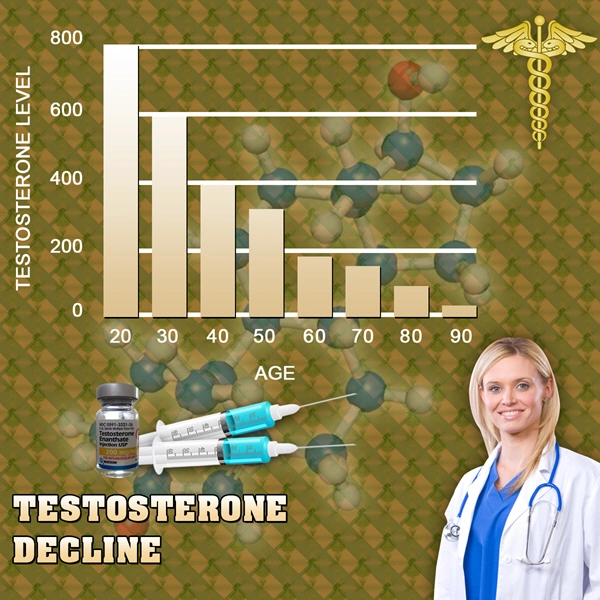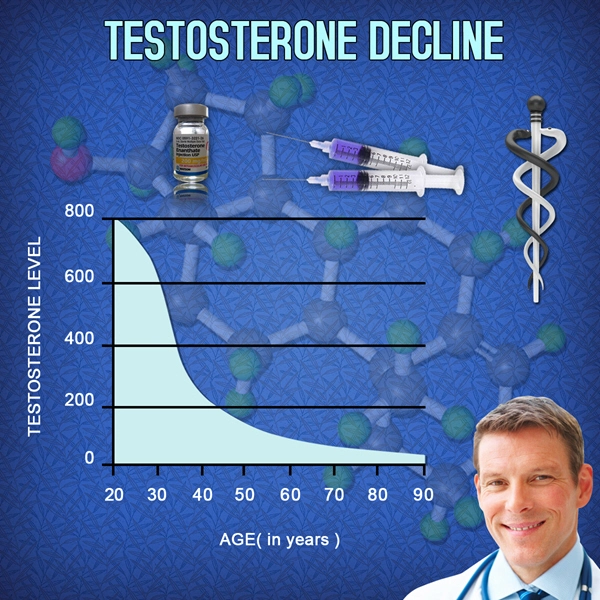Introduction
Depo Testosterone, a product of Pfizer, is a widely used injectable form of testosterone cypionate, primarily prescribed to address hypogonadism in men. As testosterone therapy becomes increasingly common, understanding its effects on cardiovascular health, particularly blood pressure, is crucial. This article delves into the relationship between Depo Testosterone and blood pressure in American males, aiming to provide a comprehensive analysis that can guide both patients and healthcare providers in making informed decisions.
The Role of Testosterone in Cardiovascular Health
Testosterone plays a pivotal role in male physiology, influencing muscle mass, bone density, and sexual function. However, its impact on cardiovascular health, particularly blood pressure, has been a subject of ongoing research. Testosterone can affect the vascular system by modulating endothelial function, which is critical for maintaining healthy blood pressure levels. Studies have shown that testosterone can both vasodilate and vasoconstrict blood vessels, depending on the individual's health status and dosage.
Depo Testosterone and Blood Pressure: Clinical Insights
Clinical studies examining the effects of Depo Testosterone on blood pressure have yielded mixed results. Some research suggests that testosterone therapy can lead to a slight increase in blood pressure, particularly in men with pre-existing hypertension. A study published in the Journal of Clinical Endocrinology & Metabolism found that men receiving testosterone injections experienced a modest rise in systolic blood pressure, though the increase was generally within normal limits.
Conversely, other studies have reported no significant changes in blood pressure among men treated with Depo Testosterone. A comprehensive review in the American Journal of Cardiology indicated that testosterone replacement therapy did not significantly alter blood pressure in men without cardiovascular disease. These findings highlight the importance of individual health profiles in determining the impact of testosterone therapy on blood pressure.
Mechanisms Behind Blood Pressure Changes
The mechanisms through which Depo Testosterone may affect blood pressure are multifaceted. Testosterone can influence the renin-angiotensin system, which regulates blood pressure by controlling fluid and electrolyte balance. Additionally, testosterone may impact sympathetic nervous system activity, which can lead to changes in blood pressure. The balance between these effects can vary among individuals, explaining the variability in clinical outcomes.
Monitoring and Management Strategies
Given the potential for Depo Testosterone to affect blood pressure, regular monitoring is essential for men undergoing testosterone therapy. Healthcare providers should conduct baseline blood pressure assessments before initiating treatment and continue to monitor it regularly. For men with a history of hypertension or cardiovascular disease, more frequent monitoring may be necessary.
In cases where Depo Testosterone leads to elevated blood pressure, adjustments to the treatment regimen may be required. This could involve modifying the dosage or frequency of injections, or incorporating antihypertensive medications. Collaboration between endocrinologists and cardiologists can ensure a holistic approach to managing both testosterone levels and cardiovascular health.
Lifestyle Considerations for American Males
American males considering or currently using Depo Testosterone should be mindful of lifestyle factors that can influence blood pressure. Regular physical activity, a balanced diet rich in fruits and vegetables, and stress management techniques can help mitigate any potential adverse effects of testosterone therapy on blood pressure. Additionally, avoiding excessive sodium intake and maintaining a healthy weight are crucial for overall cardiovascular health.
Conclusion
Depo Testosterone from Pfizer is a valuable tool in managing hypogonadism, but its effects on blood pressure require careful consideration. While some studies suggest a potential for increased blood pressure, others indicate no significant changes. Individual monitoring and tailored management strategies are essential to ensure that the benefits of testosterone therapy outweigh any potential risks. By staying informed and proactive, American males can navigate the complexities of testosterone therapy while safeguarding their cardiovascular health.

- Depo Testosterone Therapy: American Men's Experiences and Impact on Quality of Life [Last Updated On: March 17th, 2025] [Originally Added On: March 17th, 2025]
- Depo Testosterone: Psychological Impacts on American Men's Mental Health [Last Updated On: March 18th, 2025] [Originally Added On: March 18th, 2025]
- Depo Testosterone: Enhancing Sexual Health in American Men with Low Testosterone [Last Updated On: March 18th, 2025] [Originally Added On: March 18th, 2025]
- Depo Testosterone: Benefits, Risks, and Usage Guidelines for American Males [Last Updated On: March 19th, 2025] [Originally Added On: March 19th, 2025]
- Depo Testosterone: Enhancing American Men's Health Through Hormone Therapy [Last Updated On: March 19th, 2025] [Originally Added On: March 19th, 2025]
- Depo Testosterone: Efficacy, Safety, and Clinical Trials in American Males [Last Updated On: March 19th, 2025] [Originally Added On: March 19th, 2025]
- Tailoring Depo Testosterone Therapy for American Males: Optimizing Health Outcomes [Last Updated On: March 20th, 2025] [Originally Added On: March 20th, 2025]
- Depo Testosterone's Impact on Weight Management in American Males: Recent Studies [Last Updated On: March 20th, 2025] [Originally Added On: March 20th, 2025]
- Depo Testosterone: Accessibility, Insurance, and Steps for U.S. Men's TRT [Last Updated On: March 20th, 2025] [Originally Added On: March 20th, 2025]
- Depo Testosterone: Efficacy, Safety, and Management in Older American Men [Last Updated On: March 21st, 2025] [Originally Added On: March 21st, 2025]
- Depo Testosterone: Managing Chronic Conditions in American Men with Hypogonadism [Last Updated On: March 21st, 2025] [Originally Added On: March 21st, 2025]
- Depo Testosterone: A Comprehensive Guide for Transgender American Males [Last Updated On: March 21st, 2025] [Originally Added On: March 21st, 2025]
- Depo Testosterone Therapy: Enhancing American Male Health and Vitality [Last Updated On: March 21st, 2025] [Originally Added On: March 21st, 2025]
- Depo Testosterone: Boosting Energy and Vitality in American Men with Low Testosterone [Last Updated On: March 22nd, 2025] [Originally Added On: March 22nd, 2025]
- Depo Testosterone: Efficacy and Safety in American Male Veterans with Hypogonadism [Last Updated On: March 23rd, 2025] [Originally Added On: March 23rd, 2025]
- Depo Testosterone: Enhancing Performance in American Male Athletes - Benefits and Risks [Last Updated On: March 23rd, 2025] [Originally Added On: March 23rd, 2025]
- Depo Testosterone: Balancing Hormone Therapy and Fertility Preservation in American Males [Last Updated On: March 23rd, 2025] [Originally Added On: March 23rd, 2025]
- Depo Testosterone's Impact on Blood Sugar Levels in American Males [Last Updated On: March 23rd, 2025] [Originally Added On: March 23rd, 2025]
- Depo Testosterone's Impact on Immune Function in American Males: A Detailed Analysis [Last Updated On: March 24th, 2025] [Originally Added On: March 24th, 2025]
- Depo Testosterone and Hair Loss: Insights and Management Strategies for American Men [Last Updated On: March 24th, 2025] [Originally Added On: March 24th, 2025]
- Securing Insurance Coverage for Depo Testosterone: A Comprehensive Guide for American Men [Last Updated On: March 25th, 2025] [Originally Added On: March 25th, 2025]
- Depo-Testosterone's Impact on Sleep Quality in American Men: Benefits and Challenges [Last Updated On: March 25th, 2025] [Originally Added On: March 25th, 2025]
- Depo Testosterone: Enhancing Cognitive Function in American Males with Low Testosterone [Last Updated On: March 25th, 2025] [Originally Added On: March 25th, 2025]
- Depo Testosterone in Endurance Sports: Benefits, Risks, and Ethical Issues for American Athletes [Last Updated On: March 25th, 2025] [Originally Added On: March 25th, 2025]
- Depo Testosterone: Treating Anemia in American Men with Pfizer's Injectable Therapy [Last Updated On: March 25th, 2025] [Originally Added On: March 25th, 2025]
- Depo Testosterone: Benefits, Liver Risks, and Monitoring for American Men [Last Updated On: March 25th, 2025] [Originally Added On: March 25th, 2025]
- Depo Testosterone: Treating Delayed Puberty in American Males with Pfizer's Solution [Last Updated On: March 25th, 2025] [Originally Added On: March 25th, 2025]
- Depo Testosterone: Impacts on Prostate Health and Monitoring Guidelines for American Men [Last Updated On: March 25th, 2025] [Originally Added On: March 25th, 2025]
- Depo Testosterone: Enhancing Mood and Well-being in American Males with Hypogonadism [Last Updated On: March 25th, 2025] [Originally Added On: March 25th, 2025]
- Depo Testosterone: Enhancing Life for American Male Cancer Survivors [Last Updated On: March 26th, 2025] [Originally Added On: March 26th, 2025]
- Depo Testosterone: Benefits and Risks for American Male Adolescents [Last Updated On: March 26th, 2025] [Originally Added On: March 26th, 2025]
- Depo Testosterone: Managing Skin Effects in American Men [Last Updated On: March 26th, 2025] [Originally Added On: March 26th, 2025]
- Depo Testosterone: Enhancing Life Quality for American Males with HIV/AIDS [Last Updated On: March 26th, 2025] [Originally Added On: March 26th, 2025]
- Depo Testosterone: Dosage, Monitoring, and Adjustments for Optimal Therapy [Last Updated On: March 26th, 2025] [Originally Added On: March 26th, 2025]
- Depo Testosterone: Effective Solution for Low Testosterone-Related ED in American Men [Last Updated On: March 26th, 2025] [Originally Added On: March 26th, 2025]
- Depo Testosterone: Enhancing Libido and Sexual Function in American Men [Last Updated On: March 26th, 2025] [Originally Added On: March 26th, 2025]
- Depo Testosterone: A Potential Treatment for Chronic Fatigue Syndrome in American Males [Last Updated On: March 26th, 2025] [Originally Added On: March 26th, 2025]
- Depo Testosterone: Cardiovascular Risks and Benefits in American Men [Last Updated On: March 26th, 2025] [Originally Added On: March 26th, 2025]
- Depo Testosterone's Impact on American Males' Body Composition and Health [Last Updated On: March 26th, 2025] [Originally Added On: March 26th, 2025]
- Depo Testosterone's Impact on Respiratory Health in American Males: Benefits and Risks [Last Updated On: March 27th, 2025] [Originally Added On: March 27th, 2025]
- Depo Testosterone: Enhancing Fertility in American Males with Low Testosterone [Last Updated On: March 27th, 2025] [Originally Added On: March 27th, 2025]
- Depo Testosterone: Enhancing Muscle Growth and Risks for American Male Weightlifters [Last Updated On: March 27th, 2025] [Originally Added On: March 27th, 2025]
- Depo Testosterone: A Promising Solution for Osteoporosis in American Males [Last Updated On: March 27th, 2025] [Originally Added On: March 27th, 2025]
- Depo Testosterone's Impact on Joint Health in American Males: Benefits and Risks [Last Updated On: March 27th, 2025] [Originally Added On: March 27th, 2025]
- Depo Testosterone: Enhancing Stress Management in American Males with Low Testosterone [Last Updated On: March 28th, 2025] [Originally Added On: March 28th, 2025]
- Depo Testosterone's Role in Diabetes Management for American Males: Benefits and Considerations [Last Updated On: March 28th, 2025] [Originally Added On: March 28th, 2025]
- Depo Testosterone's Impact on Gastrointestinal Health in American Males: A Comprehensive Review [Last Updated On: March 28th, 2025] [Originally Added On: March 28th, 2025]
- Depo Testosterone: Essential Guide for American Males on Hormone Replacement Therapy [Last Updated On: March 28th, 2025] [Originally Added On: March 28th, 2025]
- Depo Testosterone: A Promising Treatment for Depression in American Males [Last Updated On: March 29th, 2025] [Originally Added On: March 29th, 2025]
- Depo Testosterone's Impact on Eye Health in American Males: Risks and Monitoring [Last Updated On: March 30th, 2025] [Originally Added On: March 30th, 2025]
- Depo Testosterone's Impact on Kidney Function: Insights for American Males [Last Updated On: March 31st, 2025] [Originally Added On: March 31st, 2025]
- Depo Testosterone's Impact on Dental Health in American Males: Risks and Benefits [Last Updated On: April 1st, 2025] [Originally Added On: April 1st, 2025]
- Depo Testosterone: Enhancing Thyroid Treatment in American Males [Last Updated On: April 2nd, 2025] [Originally Added On: April 2nd, 2025]
- Depo Testosterone: A Novel Approach to Managing Anxiety in American Males [Last Updated On: April 5th, 2025] [Originally Added On: April 5th, 2025]
- Depo Testosterone: Managing Autoimmune Diseases in American Males [Last Updated On: April 5th, 2025] [Originally Added On: April 5th, 2025]
- Depo Testosterone's Impact on Ear Health in American Males: A Comprehensive Review [Last Updated On: April 5th, 2025] [Originally Added On: April 5th, 2025]
- Depo Testosterone: A Potential Treatment for Insomnia in American Males [Last Updated On: April 7th, 2025] [Originally Added On: April 7th, 2025]
- Depo Testosterone: Impacts on Skin Health in American Males Undergoing TRT [Last Updated On: April 7th, 2025] [Originally Added On: April 7th, 2025]
- Depo Testosterone: Exploring Its Potential in Managing Allergies Among American Males [Last Updated On: April 8th, 2025] [Originally Added On: April 8th, 2025]
- Depo Testosterone: A Promising Treatment for Migraines in American Males [Last Updated On: April 9th, 2025] [Originally Added On: April 9th, 2025]
- Depo Testosterone: Managing Cardiovascular Health in American Males with Low Testosterone [Last Updated On: April 10th, 2025] [Originally Added On: April 10th, 2025]
- Depo Testosterone's Impact on Neurological Disorders in American Males: A Review [Last Updated On: April 11th, 2025] [Originally Added On: April 11th, 2025]
- Depo Testosterone: A Promising Treatment for Chronic Pain in American Males [Last Updated On: April 12th, 2025] [Originally Added On: April 12th, 2025]
- Depo Testosterone: A Promising Treatment for Arthritis in American Males [Last Updated On: April 12th, 2025] [Originally Added On: April 12th, 2025]
- Depo Testosterone's Impact on Respiratory Health in American Males: A Review [Last Updated On: April 13th, 2025] [Originally Added On: April 13th, 2025]
- Depo Testosterone: Managing Endocrine Disorders in American Males [Last Updated On: April 13th, 2025] [Originally Added On: April 13th, 2025]
- Depo Testosterone's Impact on Gastrointestinal Health in American Males: A Comprehensive Review [Last Updated On: April 13th, 2025] [Originally Added On: April 13th, 2025]
- Depo Testosterone's Impact on Hematological Disorders in American Males: Clinical Insights [Last Updated On: April 17th, 2025] [Originally Added On: April 17th, 2025]
- Depo Testosterone: Effects on Male Fertility and Health in American Men [Last Updated On: April 18th, 2025] [Originally Added On: April 18th, 2025]
- Depo Testosterone: Managing Genetic Disorders in American Males - Benefits and Risks [Last Updated On: April 18th, 2025] [Originally Added On: April 18th, 2025]
- Depo Testosterone: Managing Hypogonadism, ED, and BPH in American Males [Last Updated On: April 18th, 2025] [Originally Added On: April 18th, 2025]
- Depo Testosterone: Enhancing Musculoskeletal Health in American Males [Last Updated On: April 18th, 2025] [Originally Added On: April 18th, 2025]
- Depo Testosterone: Managing Metabolic Disorders in American Males [Last Updated On: April 19th, 2025] [Originally Added On: April 19th, 2025]
- Depo Testosterone: Managing Inflammatory Diseases in American Males [Last Updated On: April 19th, 2025] [Originally Added On: April 19th, 2025]
- Depo Testosterone: Managing Low Testosterone in American Males with Renal Disorders [Last Updated On: April 19th, 2025] [Originally Added On: April 19th, 2025]
- Depo Testosterone: A Promising Treatment for Dermatological Conditions in American Males [Last Updated On: April 19th, 2025] [Originally Added On: April 19th, 2025]
- Depo Testosterone's Impact on Psychiatric Disorders in American Males: Benefits and Risks [Last Updated On: April 20th, 2025] [Originally Added On: April 20th, 2025]
- Depo Testosterone: Revolutionizing Hormone Therapy for American Males with Hypogonadism [Last Updated On: April 21st, 2025] [Originally Added On: April 21st, 2025]
- Depo Testosterone's Impact on Cancer Risks in American Males: A Comprehensive Analysis [Last Updated On: April 22nd, 2025] [Originally Added On: April 22nd, 2025]
- Depo Testosterone Pfizer Enhances Muscle Mass and Body Composition in Hypogonadal Men: Clinical Trial [Last Updated On: April 23rd, 2025] [Originally Added On: April 23rd, 2025]



List of USA state clinics - click a flag below for blood testing clinics.
Word Count: 600


















































